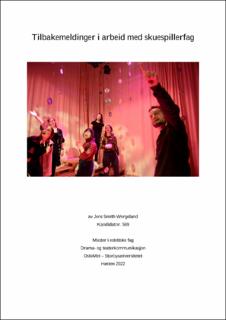Tilbakemeldinger i arbeid med skuespillerfag
Abstract
Denne masteroppgaven omhandler tilbakemeldingssituasjonen mellom studenter og mellom studenter og pedagog i arbeid med skuespillerfag. Den teoretiske undersøkelsen tar utgangspunkt i tilbakemeldingsteori av Bærenholdt og Christensen, mottakerteori av Stone og Heen og selvdeterminasjonsteori av Ryan og Deci, belyst av Øiestad. Den ser også på den særegne tilbakemeldingssituasjonen knyttet til skuespillerfaget i undervisningen av drama- og teaterstudenter og med utgangspunkt i Mitchells regierfaringer om skuespillerarbeidet. Et særlig nedslagsfelt er empiri, innhentet fra Teaterhøgskolen (KHiO), Akademiet i Fredrikstad (HiØ) og Teaterhøgskolen i Amsterdam (DasArts). Empiri og teori belyser gjennomført feltarbeid på Universitet i Stavanger (UiS) i forbindelse med egne studenters teaterprosjekt, der modeller har blitt prøvd ut og er utgangspunktet for diskusjonen.
Med en hermeneutisk-fenomenologisk tilnærming med utgangpunkt i praksisledet forskning har jeg anvendt grounded theory som analyseverktøy for å fremsette teoretiske betraktninger, der målet har vært å diskutere og belyse ideelle tilbakemeldingspraksiser i drama- og teaterfeltet. Gjennom praksis og forskningsbasert analysearbeid, har tre ulike tema kommet til syne. Disse står sentralt i oppgavens diskusjonsdel og peker på oppgavens konklusjon; utformede modeller til bruk i arbeidet med tilbakemeldinger i skuespillerfag. Temaene er: Relasjonen mellom mottaker og avsender av tilbakemeldinger, Tilbakemeldingens form og innhold, og De individuelle nivåene i tilbakemeldingssituasjonen. Temaene diskuteres, fortolkes i lys av feltarbeid, og analyseres opp mot valgt teori og empiri. This master thesis concerns the feedback-situation between students and between students and teachers working with acting. The theoretical enquiry is based on feedback theory by Bærenholdt and Christensen, recipient theory by Stone and Heen and self-determination theory by Ryan and Deci, illuminated by Øiestad. The thesis also investigates the distinctive feedback-situation in acting and in the teaching of drama and theatre students based on Mitchell`s directing experiences and its influence on the work with actors. A particular focus lies on ideal practices, data gathered from Oslo National Academy of the Arts, Norwegian Theatre Academy and The Academy of Theatre and Dance in Amsterdam. Practice and theory make the basis of my field work at the University of Stavanger, in connection to my own student`s theatre work, where different feedback-models were tried out and make the foundation of this thesis discussion.
I have, by using a hermeneutical-phenomenological approach, based on practice-led research, analyzed data with the use of grounded theory as methodology, to present theoretical reflections. The goal has been to find and discuss ideal feedback practices in the drama and theatre field. Through the practice and research-based analysis work, three different themes have come into view. These three themes are essential to the discussion and points towards the thesis`s conclusion, which is proposed new models to be used in the work with feedback in acting classes. The themes are: The relationship between sender and receiver of feedback, The form and content of the feedback and The individual levels in the feedback situation. The themes are discussed, interpretated in the light of the field work, and are analyzed up against chosen theory and practice.
